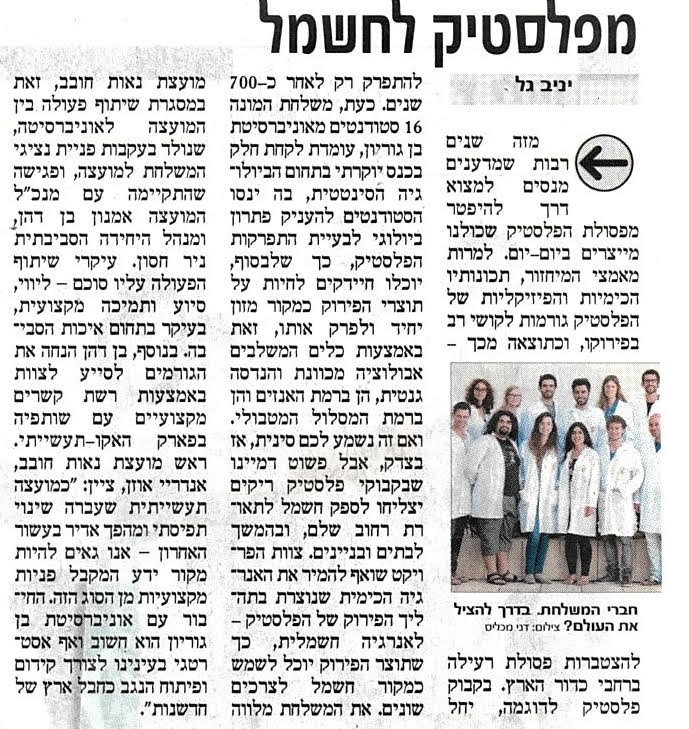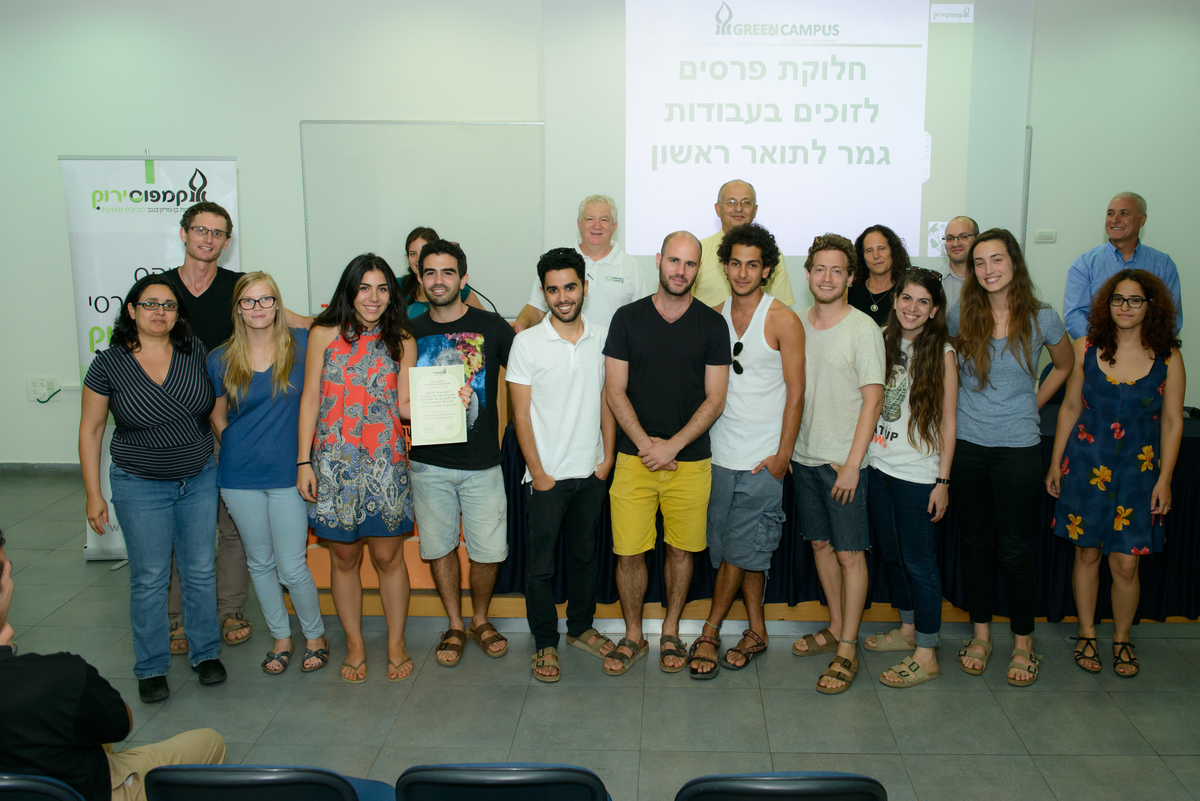Human Practices
Human practice is an integral and inseparable part of iGEM. We, PlastiCure, chose to focus on a major environmental subject that is of worldwide concern. Therefore, one of our goals was to reach a diverse community, expose and explain about this major problem, plastic waste, which humanity is faced with. We believe that in order to make a difference and create an impact, society needs to be aware of this major issue. In our project we highlight this field thought different strategies - first, we acquired extensive knowledge about the plastic waste problem and how it is dealt with. Later, we focused on passing this knowledge to the general public, through public engagement and various media channels. You can learn more about our work below.
Plastic Art

Policies
Acquiring Knowledge
In every science experiment, the first step is to gather information from Previous studied, and introducing the experiment subject. We have met senior professors and researchers who focuses on different aspects of plastic waste.
Prop. Alex Sivan, a researcher from our university that one of his research interests is Microbial degradation of plastic wastes. We consulted prop. Sivan about the enzyme we should work with. Along to wide Literature research, we have learned that LC - Cutinase is an enzyme who known for his ability to break PET bond into it monomers ethylene glycol and terephtalic acid, and we have noticed that there are an extend researches about LC - Cutinase attribute. From that point we decided to work with LC - Cutinase as the PET first bond breaker.
We also consulted Dr. Sarel Flaysman, an investigator from Department of Biological Chemistry, Weizmann Institute of Science. We contact Dr. Flaysman in order to introduce him our project and to utilize his knowledge about proteins. Dr. Flaysman suggest us to use his algorithm- PROSS, who preform rational mutations in proteins and improve their activity by making them more thermodynamic stable.
We met Prof. Amir Aharoni, a researcher from our university that focus in Protein Engineering for the study of complex biological processes. Prof. Aharoni helped us to apply our theoretical knowledge to lab terms.
Meanwhile we also investigated the metabolic pathway part, we read lot of article and found out about the Pseudomonas putida bacterium and it qualitys. Prop. De Lorenzo, his research exploits advanced molecular biology and genetic engineering of microorganisms, like P.Putida, for the sake of biomonitoring, bioremediation etc. We contact him and ask about the P.Putida bacterium.
Prop. De Lorenzo helped us a lot, and sent us pSEVA plasmids for P.Putida and refer us to Prof. Dan Tawfik and Dr. Halim Jubran, Department of Bimolecular Sciences, Weizmann Institute of Science, which provided us P.Putida KT 2440.
We also consulate Dr. Shimon Bershtein, Faculty of Natural Sciences, Ben-Gurion University of the Negev, about Assistance with P.putida resistances and genetic engineering. As we gather information about the metabolic pathway we moved to design our science research. Thus, we discuss our PIs for science advices and efficient work patterns.
After we gather these Valuable information, we were ready to start the lab research.
One of our major goals in the project was to raise awareness of the plastic hazard. Therefore, before we could pass our knowledge to others, we have done a comprehensive investigation of plastic's implications.
Throughout the project we have met experts who deal with plastic as a raw material in industrial ways, the main ones was - Coca-Cola Company, Genome compiler and Carasso Science Park . We have learned about plastic's convenient properties that makes him so popular and easy to use, such as- flexibility, rigidity, lucidity and much more.

Finally, we aimed to get familiar with plastic waste degradation solutions. Therefore, we visit 'Neot Hovav- eco industrial park', 'Aviv- Recycling Industries' and 'ADAMA Agricultural Solutions'. At our visit in Aviv recycling plant we saw and understood the process of plastic recycling – from the arrival of the plastic bottle to the plant, to transforming it to raw material for other products. One of the most interesting and important things we've learned during the tour is that 99% of the raw material (the output of the recycle process) is than used to producing products that cannot go through the recycle process again. It was here, that we really understood the enormous damage lies in plastic waste and that we have to find a different solution to deal with this problem.


The investigate process we have done helped us understand how major and severe the issue of accumulate of plastic waste is. This increase our motivation to work harder in order to find an efficient solution.
Public Outreach
After we extend our knowledge we turn to pass it to the public. We tried to reach as many people as possible, in order to raise their awareness to plastics solution disadvantages thus encourage controlled consumption. We did it thought public events and media channels. First we opened a twitter, Instagram and facebook accounts, followed by thousands of people. We updated those accounts daily with new data about the wide world plastic waste problem, our project, and many fact related to the subject. In the social media we also published our events, answer people questions and attract people attention towards our project.
Another way to Engage and educate the crowd was by publish in many newspapers all over Israel, among them 'Haaretz', the oldest and one of the biggest newspaper in Israel. We were published it two issues of 'Haaretz'- the local Israeli issue and the English newsletter version.
In the article we interviewed about our environmental concern and the research we conduct to solve it. We also mentioned the advance synthetic biology tools we are using in the lab and talked about the significant attribute of iGEM project to science. For the full article click here


One of our best accomplishments to achieved was Queen Noor twittered 'HAARETZ' article about our project- this tweet reacted by almost 250 people and reached to all thousands of Queen Noor's followers.

we have reached was winning 'Green Campus award'. 'Green Campus' is a green competition occur in our university. Any student with an Innovative idea concern the environment can apply. We won first place and got recognition from our university.


In order to reach diverse communities, we also participated in an environment radio show, hosted by south radio channel. On the show we discussed the existed plastic waste solutions and explained the necessary of biosynthetic solution.
To make our project more accessible we created a fun computer game and animation video. Those attracted and exposed many people to our goals. The computer game demonstrate our idea as a simple task, which a bacteria eating plastic parts by shooting them. Because the mission is not that easy, we made the game in a medium-high level of difficulty. If you lose the game, a picture of ocean full of plastic waste is shown. We sent the game to all iGEM groups along to our project description and ask them to spread it as much as they can. We also upload the game to our website and our social media accounts. You can check it out here

The animation video we created present our project in attractive and simple way. Due to that people who don't have synthetic biology background can understand the project and the science behind it.
Public Engagement
In order to engage and educated the general public from diverse backgrounds and different ages we participated and conduct 4 central events. In each of those events participated hundreds of people who came to learn of our new solution to plastic waste and were reminded to recycle and use plastic wisely. We also explained about synthetic biology, protein engineering and advance biological tools that we used in order to evoke the crowd curiosity towards science.
"osim rehov / making a street" event:
On Wednesday the 25th of May we participated in the "Osim Rechov" project. The "Osim Rechov" is a community project in which the citizens of Beer-Sheva, old and young gather together to improve the communal space and the street's appearances. The PlasticCure team created together with students, children and adults from the neighborhood, an environmental sculpture using plastic bottles. We collected plastic bottles from our neighborhoods in Be'er-Shva during a whole month; with them we created colorful flowers, and decorated the street. Making that activity we managed to use plastic waste and make it into an art that will be permanent.
In addition to the plastic sculpture, we wanted to teach children in an easy and fun way on the plastic pollution and our new solution. Our way of passing it on was making a quiz in which the children had to answer questions about plastic facts.
In order to raise awareness to the plastic pollution among the older public – students and neighborhood residents we passed brochures with information on our project and its purpose. We also invited students into the lab showed them the tooles we are using in our lab and explained on our future plans.




"Lyla lavan / white night" event:
On Thursday the 25th of august we took part in "White Night" event. This event happens once a year, allowing the public celebrate in the streets of Be'er-Sheva all night long, enjoying concerts performed by Israeli artists, shows, and stands set up by artists, venders and special projects.
We build a 'drop the bottle' game in the shape of our bacterium, P.putida. The game attracted both young and old trying to drop the plastic bottles into the bacterium's mouth and win a prize. We aimed to attract people with the game and arouse their curiosity with it. Our game allowed us to interact with people of all ages and explain about plastic pollution, our solution to it and the importance of recycling.
The prizes were made of environmental friendly materials such as seeds and green recycle bags. The recycling bags had added value since that in the last month a new law was implemented. The new law obligates the stores to charge for plastic bags forbidding them to hand them freely. We decided to hand out recycling bags with our logo knowing they would come in handy along with that, that we truly support the new law and hope that it would help educate the public to be more environment friendly.




"Science with a beer" event:
On Sunday October 25th we organized a public environmental event in a local bar open. The event's name was appropriately named "Science with a beer", type of an event concept that is well known the Israeli public. In the event an expert lecturer or a public figure discuss about the field of his expertise.
In our event, we hosted the Knesset member Yael Cohen - Paran to talk about her social - public activity in the field of Environmental protection. Cohen – Paran in one of the founders of the "Green Movement" party, the founder and head of "The Israeli Forum for Energy". The forums goal is advancing sustainable energy in Israel. In 2013 Cohen – Paran was chosen by TheMarker post for one of "Israel's 100 most influential people"
Many people from different ages and background came to the event from Be'er-Sheva and its surroundings. The crowd enjoyed cold beer and listened to Cohen – Paran lecture on her 20 years of work and devotion to the subject of Environmental protection. We learned of environmental hazards in the Negev area we weren’t aware of and what we can do inorder to help solve them. At the end of the lecture people asked questions regarding Environmental protection issues and Cohen – Paran take on them.
In the end of the lecture we presented our project and its relevance to one of the worst environmental pollutions Cohen – Paran talked to us about - the plastic pollution.




Board of Governors Meeting:
On the 5th of June we participated in a night in honor of the University's Board of Governors. At the event we set up a stand in which we discussed our new evolutionary project with people gathered from around the world. Many people came to hear of the acute plastic pollution and plastic accumulation in the world and in Be'er-Sheva in particular. Alongside explaining of existing solutions we presented our new solution and its advantages over them. In our stand we played a trivia game with the guests asking general questions on our city and University and plastic. In addition we handed out recycling bags to encourage recycling.






